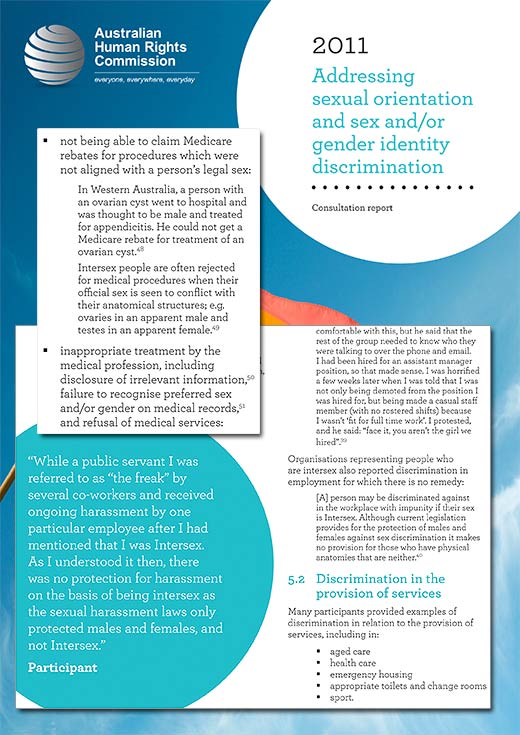Australian Human Rights Commission releases 2011 consultation report
The Australian Human Rights Commission 2011 consultative report Addressing sexual orientation and sex and/or gender identity discrimination is a landmark report.

The inclusion of intersex people in this report indicates how crucial it is for us to directly engage with government and its agencies in seeking equality and human rights for intersex people.
No nation in the world has yet achieved that. South Africa made a good start by including intersex in its Sex Discrimination Act. Colombia was the first and so far only nation to purportedly ban intersex genital mutilation (IGM).
Change in both countries only came about through direct engagement with government by intersex activists. The Australian Human Rights Commission (AHRC) report’s inclusion of intersex is the product of direct engagement as well. Such change does not happen overnight.
Our first engagement with the AHRC led to a negative outcome for intersex people. We were briefly listened to then ignored, our specific needs and concerns sidelined and a report containing recommendations damaging to intersex people was issued by the then Commissioner. That document, The Sex Files, works for trans* people, but not for us.
So we had to do a great deal more, and continued our work work behind the scenes, redoubling our efforts and more. Now it is all starting to pay off. A Federal Parliamentary committee is considering the issue of human rights. The Attorney General met with us and indicates he is sympathetic to intersex people’s need for equality and human rights. Intersex are now being listened to in other states and territories and intersex organizations are now included in the membership of peak organizations.
OII Australia’s experiences in this country prove that direct engagement is possible and achieves positive outcomes. We have our antagonists who would prefer that intersex persecution continues same as it ever was, just as it does in almost every other part of the world. Sometimes we lose, as we did the The Sex Files and intersex exclusion from the federal Department of Health & Ageing’s draft report on aged care, and sometimes we win.
What is crucial is that we continue the process of direct engagement and that we do it in every form available to us, at every opportunity.
A number of intersex people and organisations, including OII Australia, participated in the consultation process. The report document contains a number of quotes from intersex Australians living in different states and territories of this country.
More information
- OII Australia – Intersex & The Sex Files: Good for trans, not good for intersex
You must be logged in to post a comment.